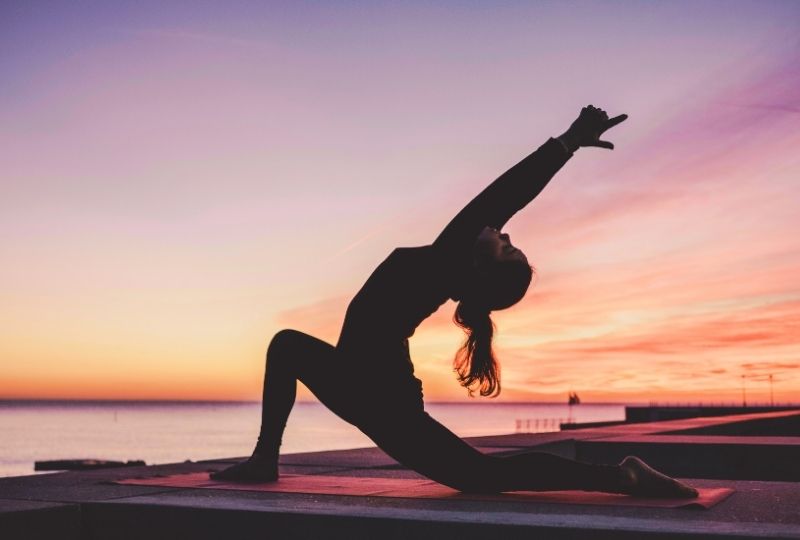Yoga is one of the best practices for physical and mental well-being, combining movement, breathing, and mindfulness. Whether you want to increase flexibility, reduce stress, or improve overall health, yoga is a powerful yet accessible way to achieve these benefits.
If you’re new to yoga, you might wonder where to start, what poses to try, and how to make it part of your daily routine. In this guide, you’ll learn everything you need to know about starting yoga as a beginner.
What Is Yoga?
Yoga is an ancient practice that connects the body, mind, and breath through physical postures (asanas), breathing techniques (pranayama), and meditation. It has been practiced for over 5,000 years and continues to be one of the most effective ways to enhance health and well-being.
Health Benefits of Yoga
1. Improves Flexibility and Mobility
Yoga stretches and lengthens muscles, improving range of motion and joint flexibility.
✅ Great for: Reducing stiffness, improving posture, and preventing injuries.
2. Builds Strength and Balance
Yoga isn’t just about stretching—it also strengthens muscles and improves stability.
✅ Great for: Core strength, better posture, and reducing falls or injuries.
3. Reduces Stress and Anxiety
Yoga activates the parasympathetic nervous system, lowering stress hormones like cortisol.
✅ Great for: Relaxation, emotional balance, and mental clarity.
4. Enhances Focus and Mental Clarity
By focusing on breathing and movement, yoga improves concentration and mindfulness.
✅ Great for: Boosting productivity and mental sharpness.
5. Supports Better Sleep
Yoga calms the nervous system, helping you fall asleep faster and stay asleep longer.
✅ Great for: Insomnia relief and improving sleep quality.
How to Start Yoga as a Beginner
1. Choose a Yoga Style That Fits Your Goals
There are different types of yoga, each with unique benefits.
🔹 Hatha Yoga – Gentle and slow, great for beginners.
🔹 Vinyasa Yoga – Flowing movements with breath coordination.
🔹 Yin Yoga – Deep stretches held for longer periods, great for flexibility.
🔹 Restorative Yoga – Focuses on relaxation and deep breathing.
✅ Tip: If you’re new to yoga, Hatha or beginner Vinyasa classes are the best starting points.
2. Start with Basic Yoga Poses
You don’t need to be flexible to start yoga! Begin with simple, foundational poses.
✅ 5 Beginner-Friendly Yoga Poses:
1️⃣ Mountain Pose (Tadasana) – Improves posture and grounding.
2️⃣ Downward Dog (Adho Mukha Svanasana) – Stretches the back, hamstrings, and arms.
3️⃣ Child’s Pose (Balasana) – Relaxes the body and reduces stress.
4️⃣ Warrior II (Virabhadrasana II) – Builds strength and balance.
5️⃣ Seated Forward Bend (Paschimottanasana) – Improves flexibility and relaxation.
3. Focus on Breathing (Pranayama)
Breathing is the foundation of yoga. Practicing deep, mindful breathing helps calm the mind and improve body awareness.
✅ Try This:
- Inhale deeply through the nose for 4 seconds.
- Hold for 4 seconds.
- Exhale slowly through the mouth for 6 seconds.
4. Start with Short Sessions (10–15 Minutes)
You don’t need an hour-long class to get the benefits of yoga. Start with 10–15 minutes daily and gradually increase your practice.
✅ Tip: Follow guided sessions on YouTube (Yoga with Adriene, SarahBethYoga) or apps like Down Dog.
5. Create a Comfortable Yoga Space
Find a quiet, comfortable area where you can practice without distractions.
✅ Essentials for a Good Yoga Practice:
- Yoga mat for cushioning and grip.
- Loose, comfortable clothing for movement.
- Soft lighting or candles to create a relaxing atmosphere.
6. Be Patient and Listen to Your Body
Yoga is not about perfection—it’s about progress. Don’t force yourself into poses that feel uncomfortable.
✅ Tip: Modify poses as needed and take breaks when necessary.
7. Practice Consistently
Even a few minutes of yoga per day can make a difference over time.
✅ Best Times to Practice Yoga:
- Morning – Boosts energy and sets a positive tone for the day.
- Evening – Helps unwind and relax before sleep.
Common Yoga Myths (And the Truth!)
🚫 “I’m not flexible enough for yoga.” → Yoga helps you become flexible—you don’t need to be flexible to start!
🚫 “Yoga is just stretching.” → Yoga builds strength, endurance, and balance too.
🚫 “I need to practice for an hour for it to work.” → Even 10–15 minutes has benefits.
Final Thoughts
Yoga is one of the best ways to improve physical, mental, and emotional health—and it’s never too late to start!
Begin with simple poses, focus on breathing, and be patient with yourself. Over time, yoga will become a natural and enjoyable part of your daily routine.
Ready to start? Roll out your mat and take your first deep breath—your yoga journey begins now!
